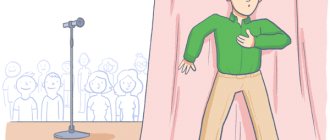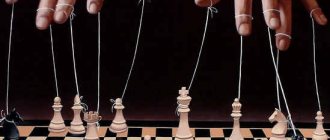By and large, people believe that experiencing fear is something shameful and wrong. But in reality, fear is an indispensable part of human life experience, and it is common for all living beings on the planet to experience it. Fear is a part of reality, but, as you know, a person has not yet reached the level where he can control it. Therefore, the only thing that remains for us is to take control of ourselves, i.e. their reaction to fear, however, not everyone can do this. The reason here lies in simple ignorance. We want to correct this by talking about how to learn to work through your fears. It would be right to start with some features of fear in general.
What is fear and why is it needed?
Fear
- an internal state caused by a threatening real or perceived disaster. Wikipedia.
The feeling of fear is familiar to everyone. It covers the feeling of happiness
, well-being and limits opportunities (in realization, creativity, in building close relationships).
Because of fear, a person commits actions that he later regrets. Fear-filled behavior is defensive
in nature. Man gradually becomes stupid and degenerates.
A person focuses all his attention on ensuring his own safety and creating means of protection. But this is not effective.
Everyone faces fear. Therefore, it is important to understand how fear works. How it works and why it is really needed.
Fear has an extremely important useful function - it helps to act in life-threatening situations. Fear helps you survive where there is a real threat
life.
Under the influence of fear, a person mobilizes all his strength in three types of rescue reactions: fight, run, freeze. Those. fear helps you act instantly to save your life. This is a lot of stress for the body.
In life-threatening situations, a person understands exactly what he is afraid of, what exactly poses a threat to him. And therefore he understands what needs to be done.
It is important to understand that most fears are not related to real danger and do not threaten human life. But remaining unconscious, they encourage a person to remain in constant tension and stress. And this leads to suspiciousness, anxiety, insomnia, depression and panic attacks. A person lives in a constant struggle with dangers and never feels free.
Therefore, fear must be recognized. When we know exactly what we are afraid of, then we know what to do about it.
Thus, there is rational fear (fear when there is a real threat to life) and irrational (when a person does not understand the meaning of the threat and does not know how to protect himself from it).
Compensation
Speaking of fear, among the main points, of course, we must mention the issue of compensation. Perhaps no type of dissatisfaction inherent in people is compensated for so violently as dissatisfaction caused by fear. The desire not to be afraid, to avoid the discomfort that fear brings and the repetition of traumatic experiences, can be very strong, and in some cases, one of the dominant desires of a person in general.
Firstly, most people compensate for their fear of people by creating a strong and confident or even an aggressive and intimidating image of themselves - whether this is achieved through physical strength, anger, authority or great intelligence - does not matter. Many people literally devote their lives to building such compensation, because it allows not only to be less afraid, but also to satisfy those desires that cannot be satisfied due to fear and uncertainty. Reorienting a compensated person to work with fear itself and its causes is very difficult, because to do this you need to return to those states from which you have been running all your life, and abandon behavioral and other “developments” that you have worked on all your life. In fact, this is a regression (or at least it is perceived as such), and the motivation to be ready for it must be strong.
Secondly, there is no way to avoid mentioning the inferiority complex - after all, half of it (at least) consists of fears generated by psychological trauma (and half of it consists of ideas of “what one should be”). Compensation for an inferiority complex includes the development of internal or external qualities that will make you feel better than others - be it wealth, beauty, intelligence or your spirituality, and often the disparagement of various other advantages. Thus, brainy individuals consider the mind to be the highest value and belittle, for example, the importance of a creative gift or physical strength, and people focused on wealth will say: “If you are so smart, where is your money?” To a spiritual person, of course, it is clear as day that there is nothing and cannot be more important than spirituality, therefore, no matter how much you earn or how smart you are, you will still remain an unconscious being, meaninglessly living your worthless life.
Thirdly, fears that come from desires can also be compensated in various ways: for example, the fear of losing access to some things or impressions is compensated by hoarding, etc.
And finally, to compensate for fear, a whole separate emotion was invented - anxiety. Anxiety is necessary in order to push a person paralyzed by fear to take active action - aimed at avoiding a negative scenario. But man is a cunning creature, and compensatory emotion, in turn, is often also compensated for by meaningless actions, such as walking from corner to corner or compulsively viewing social networks, that is, by any actions other than those “needed.” However, it can be simply suppressed.
It is clear that it is impossible to count all the existing methods of compensation, but I think the principle is clear.
How does fear work?
Having understood the mechanism of how fear works, you receive a magic key that opens the door to freedom.
So, it is important to understand:
- You cannot control the feeling of fear. You can pretend it doesn't exist.
- You cannot suppress fear with will. Only external manifestations of fear can be suppressed.
- You can't deny the fear. We can admit that it really exists.
Fear
- an experience associated with a lack of control over emotions and expectations.
Fear is based on a person’s ability to simulate the future. A person creates pictures of the future based on his past experiences. That is, he takes a situation from the past and transfers it to the future.
If this situation involved an unpleasant, painful experience, then the person is afraid of its repetition.
For example, parents scolded a child for getting a bad grade. Transferring this situation into the future, he will be afraid of getting a bad mark. He received a deuce while answering at the board. He will probably be afraid to go to the board. While in class while questioning students. he will be constantly stressed. This will lead to poor performance. And there will be more twos in the diary. A deep fear of punishment will lead to more punishment.
There are two moments in the formation of fear:
- Having a traumatic experience in the past. Without experience, fear will not arise. Moreover, this experience can be either lived personally or seen in the environment. For example, a 5-year-old boy saw his parents scolding his older sister for getting bad grades. He may have a fear of punishment, although he does not yet have experience of going to school. Or a person has a fear of death, although he has no experience of dying.
- The presence of experience does not mean that fear necessarily arises. Fear arises when trying to predict the future. Thoughts and expectations about future events create fear. No thoughts about the future - no fear.
If we know that the basis of fear is a person’s ability to foresee the future, it becomes clear that a person experiencing fear does not live in the present. He lives in the future. And exiting into the present, in the Here and Now, deprives fear of its power, and it disappears. Myself. No struggle.
There is no fear in the present moment. He is present only in anticipation of the planned future.
Therefore, many actors, presenters, and coaches say that they feel fear of performing immediately before going out in public. And then he disappears. They simply stop expecting a situation of failure and immerse themselves in living the current moment.
Control
Control can be considered one of the ways to compensate for fear, but control itself can be a consequence equally of fear, desire, and even suggestion.
Control as compensation for fear is manifested in the intention, firstly, to keep one’s own manifestations within certain limits - and in this aspect it can be called synonymous with suppression, as well as in external control - both, if possible, the behavior of others, and the external situation in general: starting from the need to always have a supply of money “for a rainy day” (or at least food and matches) and ending with obsessive control of gas water heaters and door locks.
A separate type of control is the so-called clarity of mind, which arises as a result of the desire not to lose control of the first layer of the mind, which means not to “give in” to emotions, feelings, desires or anything else that can disrupt clear and consistent thinking, as well as ability to act similarly. For many people of mind, such “clarity” is their habitual state, from which it is impossible to get out of one’s own free will and to which there is no alternative except, perhaps, alcohol and other types of intoxication, which are so loved by many precisely for the respite they provide, and the opportunity to be a little more spontaneous, relaxed and free for at least some time - however, the feeling of guilt in the morning often negates all the benefits of such therapy. However, people with a completely “clear” mind are proud of their ability not to get drunk. In a sober state, this clarity seems to be something taken for granted, a natural state of mind, and, of course, it will not retreat anywhere when you need to practice expression, look at fears or desires. Any attempt to pull anything out of the unconscious mind will be smashed against the wall of the mind's self-control, and the same expression will either require a high degree of internal intensity - for the emotions to rise despite the mind being almost untouched by them, or will not succeed at all.
It’s a very bad thing when a person considers such clarity to be some remarkable trait of his personality and looks down on those who cannot boast of it. Then the lack of results in the practice of expression, and sometimes even the absence of internal problems at all, is passed off as an achievement, of which it may be impossible to convince a person who has already been doing something (or seemed to be doing something) in terms of working on himself. However, all people of intelligence are, to one degree or another, proud of their control.
Some people confuse mental clarity with non-identification: they think that when they can feel an emotion and at the same time calmly think about anything, remaining “independent” of it, being apart (sometimes accompanied by the visualization of looking from the outside, from a point somewhere above from behind the head), then this is disidentification, although, of course, this is in its pure form a state of control, which is accompanied by a high degree of identification with the mind and attachment to maintaining its “calm” state. You can call this “neurotic disidentification.”
In general, if we talk about control in relation to our topic of fear, then many people have fear behind not one, but two walls: behind the wall of control over emotions and the wall of control over the mind. And if the first of them can still be “boosted” by appropriate practices, then the second will not succumb until, firstly, the level of awareness allows achieving at least a slight disidentification with the mind, and secondly, if a person has a desire at all break this wall, because along with it many compensation mechanisms will fall down.
Should we be afraid of fears?
Remember the example about how a child, fearing punishment for getting a bad grade, became afraid to answer, began to study worse, and as a result his parents began to punish more often?
Exactly what he feared happened. And this happens with any fear. The more we fear, the more defenses we build, and the more we limit our behavior. And this ultimately leads to the fact that what we tried so hard to protect ourselves from manifests itself in life.
If a person is afraid of losing a relationship, then he loses it.
If a person is afraid that they will stop loving him, this is what happens.
If a person is afraid of not realizing himself, this is what happens.
If a person is afraid of getting an incurable disease, then this also happens in his life.
And there is no mysticism or evil rock in this. If you thoughtfully and carefully consider the situation, you can see how this happens.
For example, a wife is afraid that her husband will leave her. She constantly thinks about situations in which this is possible and tries to avoid them. As a result, she begins to control her husband, check his phone, ask a lot of questions about where and with whom he was. The wife tries to limit his communication with others. And fill it with yourself. As a result, the husband gets tired of control, which is definitely not loving attention, and tries to do everything to spend as little time as possible with his wife. And if the wife does not realize her fear and does not change her behavior, then the story may well end in divorce.
Should you be afraid to experience fear?
No. But you need to realize that if it exists, then it is he who controls human behavior. And if you realize it, then Love becomes the driving force again.
Every person has the right to choose how he will act: out of Love or out of Fear.
Suppression
Of course, fear has to be suppressed. Since manifestations of fear are strictly taboo even in the commanding nafs - that is, in childhood/adolescence, when you need to bend over backwards just not to give in to your peers, who, as is known, can be very cruel (which is natural for the commanding nafs) - his active suppression persists throughout life. If in some situations fear breaks out willy-nilly (for example, during public speaking or a conflict that threatens to escalate into a fight) and makes it clear that it will not be possible to completely control it, there is nothing left but to start avoiding all such situations at any cost. In some cases, when so much fear has accumulated that a wide range of situations can lead to a state of severe fright or even a panic attack, a person has to narrow his world to a tiny “island of safety”, which in the case of clinical neurosis leads to the inability to even just leave the house and go to the store.
This is how the fear of fear manifests itself, which can be defined as the fear of discomfort that arises in moments of exacerbation of fear, as well as the fear of showing one’s fear and thus “losing one’s face” in front of others, losing authority, respect, and therefore , to be rejected by society and suffer forever, lonely and poor. Or something like that.
Starting “consciously”, or rather, intentionally, even in childhood, as an effort aimed at not showing fear: to control facial expressions, movements, intonations, and also not to feel it inside, not allowing it to influence oneself and “driving it away” by an effort of will, the suppression of fear quickly becomes automatic, triggering the very second the corresponding reaction occurs in the mind and it begins to rise in the etheric body. Suppressing fear and other emotions when we begin to work on ourselves is so habitual that it is not possible to see it fully - and sometimes even in principle - and we accept the tension that arises in certain situations, and in general is present as a constant background , as something taken for granted, and compensatory thoughts - as a natural reaction of a reasonable person. Unconsciousness gives no choice.
How to live and act out of Love? From Fear to Love in 3 simple steps.
First step. Realize your fear.
Recognize that you are driven by fear. It is real and it is he who determines your reality. Everything you think and do to protect yourself from it and organize your safety ultimately leads to a “scary” future in which exactly what you fear happens.
Second step. Find out your fear.
Honestly answer the question: “What am I afraid of?” Take some time to make a list of your fears. The more specific the fear, the easier it is to get rid of it.
Third step. Become aware of your fear.
Look into his eyes. Fear, brought from the area of the unconscious into consciousness, loses its energy and ceases to shape events leading to the embodiment of fear in life. To bring fear into awareness. you need to live it. Imagine this has already happened. What will happen in your life when what you fear happens? What are you going to do? How will you behave?
Fear
- the result of unconscious experience. Awareness of this leads to the fact that fear loses its strength and power over you.
These three steps seem too simple to be effective. But despite all the simplicity, it takes courage and courage to go through them. It is scary for a person to consciously plunge into fear. Therefore, many people need support. This could be a loved one or a psychologist.
Below I will give a list of fears that people encounter most often. He will guide you through the second step. Next, I will give several techniques so that you can carefully and independently perform step 3 and consciously live your fear.
And step number one is your decision. Only you can make the choice to “go through your fears and start living from Love.” On one's own.
Closedness
Closedness also arises mainly as a consequence of fear - first of all, fear, the roots of which lie in childhood psychotrauma. A child learns a simple truth early on: the more open you are, the more likely it is that you will be hurt. Therefore, the less you show yourself - at least spontaneously, and not in a programmed, safe way, the less you show your feelings, share your innermost things, and finally, the less you contact people in general - the easier it is to live.
Closedness is not only external: rejection of one’s manifestations always leads not only to non-expression, but also to suppressing them inside, and the desire not to experience “emotional” pain forces one to coarse one’s sensitivity, suppressing those sensations that arise in response to external stimuli. A very closed person is closed, as it were, from both sides - both from others and from himself, so he cannot be sincere not only with others, but also with himself. In addition, there is no selective closeness: being closed to “strangers”, you will never be able to fully open up even to “your own”, and remaining closed to people, you will not be able to open up to God.
Every person is closed - to a greater or lesser extent - and those who appear open are often simply more in control of themselves and operate from an “open role”. The first step to openness is the decision itself to open up, no matter what, no matter the pain it may bring or the possible consequences. Because the fruits of openness are worth it, but to live closed means to live half, if not less.
Further work on openness involves releasing control, working through fears and psychological trauma.
Find out in order to neutralize. List of fears.
We have already talked about the fact that the more painful psychological experiences a person has, the more fears he has. It is important to remember them all in order to bring them to a conscious level and gain a feeling of Freedom.
Below are examples of fears associated with psychological experiences:
- fear of public speaking;
- fear of water/drowning;
- fear of heights/flying on airplanes;
- fear of closed spaces;
- fear of loud sounds/fireworks;
- fear of fire/burn in a fire;
- fear of persecution;
- fear of hunger;
- fear of dental treatment;
- fear of visiting a doctor;
- fear of taking blood;
- fear of making an IV;
- fear of surgery;
- fear of taking pills;
- fear of getting sick;
- fear of breaking a leg/arm;
- fear of getting lost;
- fear of poisoning;
- fear of the dark;
- fear of pain;
- fear that you will feel disgust;
- fear of insects;
- fear of snakes
- fear of dogs;
- fear of thunderstorms (thunder and lightning).
To clarify the full list of fears, it is important to look at a person’s addiction. Often a person is afraid of losing what he attaches excessive importance to, what he is attached to.
Fears associated with addictions:
- fear of loneliness;
- fear of falling asleep;
- fear of betrayal;
- fear of punishment;
- fear of ridicule;
- fear of appearing weak;
- fear of being late;
- fear of losing a loved one;
- fear for the child;
- fear of parental death;
- fear of being rejected;
- fear of making acquaintances;
- fear of trying something new;
- fear of free expression of oneself;
- fear of job loss;
- fear that you will be guilty;
- fear of offending a person;
- fear that they will stop loving;
- fear that the wish will not come true.
Separately, we need to consider the group of fears formed by the environment and the media. It is enough to regularly watch the news to acquire fears that have never existed in a person’s personal experience.
Fears formed by the environment (not confirmed by personal experience):
- fear of death;
- fear of flying on an airplane;
- fear of chipping;
- fear “someone is constantly watching my life”;
- fear of being left on the street without a livelihood;
- fear of war;
- fear of natural disasters (hurricanes, storms, volcanoes);
- fear of attack;
- fear of rape;
- fear of getting infected.
New technologies also bring a lot of fears into human life. The more technological opportunities appear for human safety and comfort, the more fears arise when using them.
Examples of fears associated with technological progress:
- fear of getting into a car accident;
- fear of getting stuck in an elevator;
- fear of getting radiation from mobile phones;
- fear of getting an electric shock;
- fear of getting stuck in an elevator;
- fear of harmful radiation from microwave ovens.
This is not a complete list of fears. Everyone has their own personal set.
The “rules of the game” of fear that must be broken
First rule: fear of the mind can be compared to a movie that constantly plays in your head. To break the rules of the game is to stop watching this movie and start acting in reality.
Second rule: no rational arguments work in conditions of fear. To break the rules of the game is to perform irrational actions.
Third rule: any, even the smallest fear can be turned into a nightmare and panic. To break the rules is to pull yourself together, to limit the area of personal responsibility, thereby turning fear into a problem that needs to be solved.
Knowing these “rules of the game” and having learned to break them, you can safely begin to neutralize fears.
Method "Courage"
Many people make the mistake of thinking that superheroes have no fears. All heroes have fears, but they also have courage. Courage is the habit of taking action despite fear. It is impossible to remove fear altogether, otherwise you can die under the wheels of the first oncoming car. If there is fear, it means there is some kind of danger, and you need to take note of this and just be more careful. Do not wait until the fear passes, but act, but with caution. Fear insures
from danger, but under no circumstances should you refuse to act.
Method of “Reconnaissance”
Most of all, a person fears the unknown. This creates internal tension and a sense of danger. Here the principle of gradualism will help us, not to rush headlong into the pool, but to scout out the situation.
For example, you are afraid to ask for a promotion. Find out from your colleagues in your company who has moved up the career ladder and how. How they asked their boss for a promotion. Find out what mood your boss is in today and whether you should approach him with this question now.
Gather as much information as possible about the subject of your fear. In the case of large dogs, I would recommend reading everything about large dogs on the Internet and looking at statistics, how often dogs bite people, and how to behave correctly when interacting with dogs.










